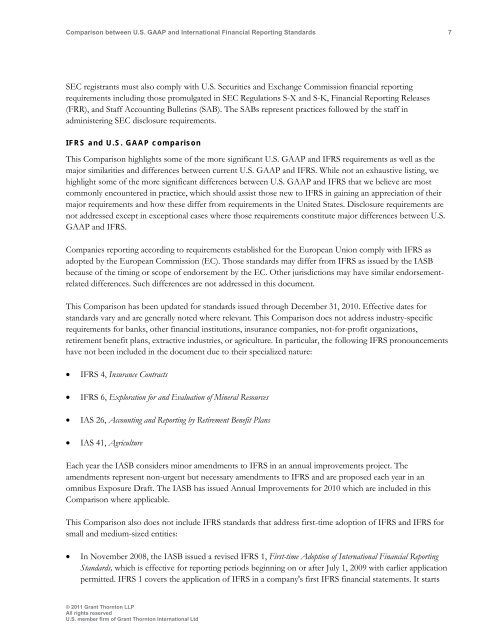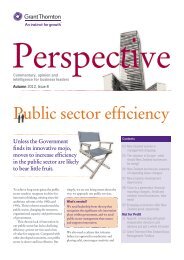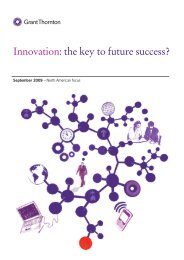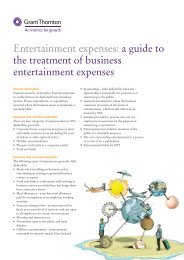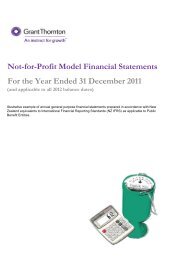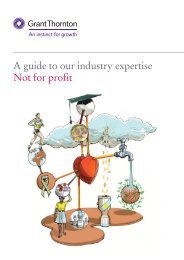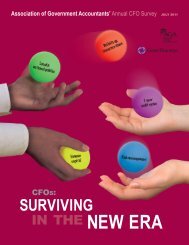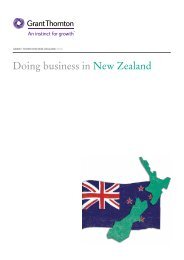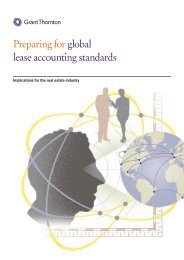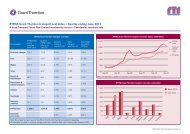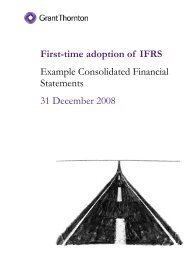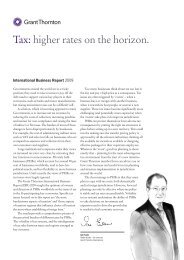Comparison between U.S. GAAP and International ... - Grant Thornton
Comparison between U.S. GAAP and International ... - Grant Thornton
Comparison between U.S. GAAP and International ... - Grant Thornton
You also want an ePaper? Increase the reach of your titles
YUMPU automatically turns print PDFs into web optimized ePapers that Google loves.
<strong>Comparison</strong> <strong>between</strong> U.S. <strong>GAAP</strong> <strong>and</strong> <strong>International</strong> Financial Reporting St<strong>and</strong>ards 7<br />
SEC registrants must also comply with U.S. Securities <strong>and</strong> Exchange Commission financial reporting<br />
requirements including those promulgated in SEC Regulations S-X <strong>and</strong> S-K, Financial Reporting Releases<br />
(FRR), <strong>and</strong> Staff Accounting Bulletins (SAB). The SABs represent practices followed by the staff in<br />
administering SEC disclosure requirements.<br />
IFRS <strong>and</strong> U.S. <strong>GAAP</strong> comparison<br />
This <strong>Comparison</strong> highlights some of the more significant U.S. <strong>GAAP</strong> <strong>and</strong> IFRS requirements as well as the<br />
major similarities <strong>and</strong> differences <strong>between</strong> current U.S. <strong>GAAP</strong> <strong>and</strong> IFRS. While not an exhaustive listing, we<br />
highlight some of the more significant differences <strong>between</strong> U.S. <strong>GAAP</strong> <strong>and</strong> IFRS that we believe are most<br />
commonly encountered in practice, which should assist those new to IFRS in gaining an appreciation of their<br />
major requirements <strong>and</strong> how these differ from requirements in the United States. Disclosure requirements are<br />
not addressed except in exceptional cases where those requirements constitute major differences <strong>between</strong> U.S.<br />
<strong>GAAP</strong> <strong>and</strong> IFRS.<br />
Companies reporting according to requirements established for the European Union comply with IFRS as<br />
adopted by the European Commission (EC). Those st<strong>and</strong>ards may differ from IFRS as issued by the IASB<br />
because of the timing or scope of endorsement by the EC. Other jurisdictions may have similar endorsementrelated<br />
differences. Such differences are not addressed in this document.<br />
This <strong>Comparison</strong> has been updated for st<strong>and</strong>ards issued through December 31, 2010. Effective dates for<br />
st<strong>and</strong>ards vary <strong>and</strong> are generally noted where relevant. This <strong>Comparison</strong> does not address industry-specific<br />
requirements for banks, other financial institutions, insurance companies, not-for-profit organizations,<br />
retirement benefit plans, extractive industries, or agriculture. In particular, the following IFRS pronouncements<br />
have not been included in the document due to their specialized nature:<br />
<br />
<br />
<br />
<br />
IFRS 4, Insurance Contracts<br />
IFRS 6, Exploration for <strong>and</strong> Evaluation of Mineral Resources<br />
IAS 26, Accounting <strong>and</strong> Reporting by Retirement Benefit Plans<br />
IAS 41, Agriculture<br />
Each year the IASB considers minor amendments to IFRS in an annual improvements project. The<br />
amendments represent non-urgent but necessary amendments to IFRS <strong>and</strong> are proposed each year in an<br />
omnibus Exposure Draft. The IASB has issued Annual Improvements for 2010 which are included in this<br />
<strong>Comparison</strong> where applicable.<br />
This <strong>Comparison</strong> also does not include IFRS st<strong>and</strong>ards that address first-time adoption of IFRS <strong>and</strong> IFRS for<br />
small <strong>and</strong> medium-sized entities:<br />
<br />
In November 2008, the IASB issued a revised IFRS 1, First-time Adoption of <strong>International</strong> Financial Reporting<br />
St<strong>and</strong>ards, which is effective for reporting periods beginning on or after July 1, 2009 with earlier application<br />
permitted. IFRS 1 covers the application of IFRS in a company's first IFRS financial statements. It starts<br />
© 2011 <strong>Grant</strong> <strong>Thornton</strong> LLP<br />
All rights reserved<br />
U.S. member firm of <strong>Grant</strong> <strong>Thornton</strong> <strong>International</strong> Ltd


